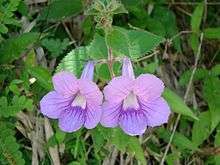Gloxinia (genus)
| Gloxinia | |
|---|---|
| Scientific classification | |
| Kingdom: | Plantae |
| (unranked): | Angiosperms |
| (unranked): | Eudicots |
| (unranked): | Asterids |
| Order: | Lamiales |
| Family: | Gesneriaceae |
| Genus: | Gloxinia L'Hér. |
| Species | |
|
See text. | |
Gloxinia is a genus of three species of tropical rhizomatous herbs in the flowering plant family Gesneriaceae. The species are primarily found in the Andes of South America but Gloxinia perennis is also found in Central America and the West Indies, where it has probably escaped from cultivation.
Gloxinia perennis is the original (type) species of the genus and for much of its history the genus consisted of only G. perennis and a very small number of other species. However, most recent references on Gloxinia reflect the 1976 classification of Hans Wiehler, who took a broad view of the genus. A recent analysis of Gloxinia and related genera based on molecular and morphological work has determined that Wiehler's circumscription of the genus was unnatural, both phylogenetically and morphologically. The analyses demonstrated that the genera Anodiscus and Koellikeria, each with a single species, were more closely related to Gloxinia perennis than were any of the other species included in Gloxinia by Wiehler, several of which proved to be more closely related to other genera (particularly Diastema, Monopyle, and Phinaea). As a result of this work, most of the species have been transferred to other genera while Koellikeria erinoides and Anodiscus xanthophyllus have been transferred into a much more narrowly defined Gloxinia consisting of only three species, all of them characterized by having a raceme-like flowering stem. The other species have been transferred to the existing genus Monopyle, the resurrected genera Mandirola and Seemannia, and the new genera Gloxinella, Gloxiniopsis, Nomopyle, and Sphaerorrhiza. Gloxinia perennis forms fertile hybrids with species of Seemannia, which was the primary reason for uniting the two genera.
Sinningia speciosa, a popular houseplant, was originally described and introduced to cultivation as Gloxinia speciosa and is still commonly known as "gloxinia".
- Species
- Gloxinia perennis has a wide range in Central and South America. The plant is an herb with large nodding, purple, mint-scented flowers. It is sometimes known as "Canterbury Bells" (not to be confused with members of the genus Campanula, which go by the same name). It is cultivated in tropical regions and its original range is unknown.
- Gloxinia erinoides (syn. Koellikeria erinoides) occurs from Costa Rica to Bolivia. The plant is a small herb with tiny white and maroon flowers. This diminutive plant is notable for having tiny but distinctly coconut-scented flowers and is occasionally cultivated as a houseplant.
- Gloxinia xanthophylla (syn. Anodiscus xanthophyllus) occurs in Ecuador and Peru. The plant is a shrubby herb with small white flowers and is rarely encountered in cultivation. Unlike the other two species it lacks scaly rhizomes.
- Excluded species

- Gloxinia burchellii = Sphaerorrhiza burchellii
- Gloxinia dodsonii = Nomopyle dodsonii
- Gloxinia gymnostoma = Seemannia gymnostoma
- Gloxinia ichthyostoma = Mandirola ichthyostoma
- Gloxinia lindeniana = Gloxinella lindeniana
- Gloxinia nematanthodes = Seemannia nematanthodes
- Gloxinia planalta = Mandirola multiflora
- Gloxinia purpurascens = Seemannia purpurascens
- Gloxinia racemosa = Gloxiniopsis racemosa
- Gloxinia reflexa = Monopyle reflexa
- Gloxinia rupestris = Mandirola rupestris
- Gloxinia sarmentiana = Sphaerorrhiza sarmentiana
- Gloxinia speciosa = Sinningia speciosa
- Gloxinia sylvatica = Seemannia sylvatica
References and external links
- Roalson, E.H., J.K. Boggan, L.E., Skog, & E.A. Zimmer. 2005. Untangling the Gloxinieae (Gesneriaceae). I. Phylogenetic patterns and generic boundaries inferred from nuclear, chloroplast, and morphological cladistic data sets. Taxon 54 (2): 389-410.
- Roalson, E.H., J.K. Boggan & L.E. Skog. 2005. Reorganization of tribal and generic boundaries in the Gloxinieae (Gesneriaceae: Gesnerioideae) and the description of a new tribe in the Gesnerioideae, Sphaerorrhizeae. Selbyana 25 (2): 225-238.
- Wiehler, H. 1976. A report on the classification of Achimenes, Eucodonia, Gloxinia, and Anetanthus (Gesneriaceae). Selbyana 1 (4): 374-404.
External links
- Anodiscus, Gloxinia, and Koellikeria from The Genera of Gesneriaceae
- Diastema, Gloxinia, Phinaea and Related Intergenerics from the Gesneriad Reference Web